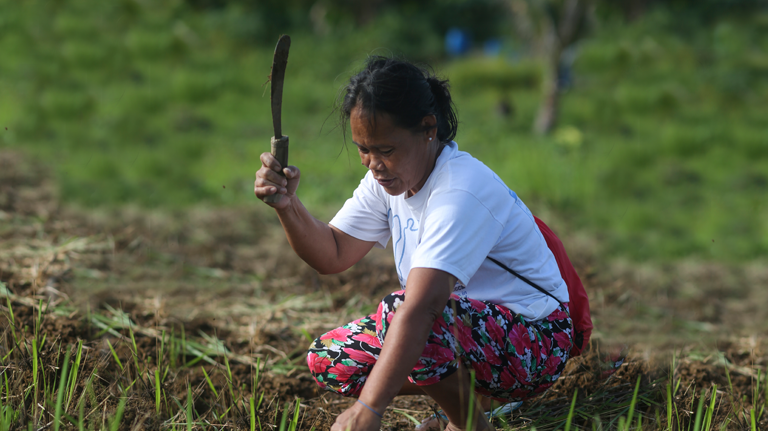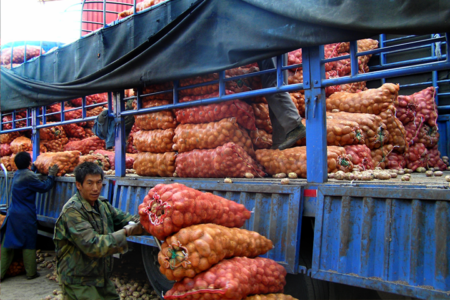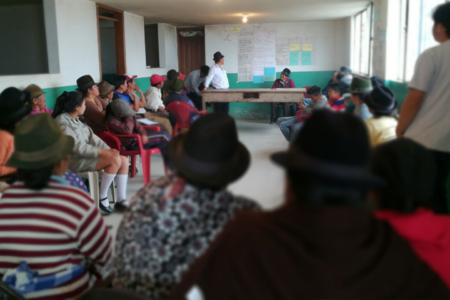
Food resilience through root and tuber crops in upland and coastal communities of the Asia-Pacific region (FoodSTART+).
Roots and tubers have great potential to support food security and resilient livelihoods among the poorest and most vulnerable people around the globe. FoodSTART, which promotes innovations for enhanced production and marketing of these underexploited crops, has completed a second phase in Asia.
Background
Although generally viewed as of secondary importance to rice, root and tuber crops (including potato, sweetpotato, cassava and yam) are popular with small-scale farmers throughout Asia. Grown as staple foods for household consumption, roots and tubers provide a good source of energy, vitamins and micronutrients. They grow in challenging conditions, survive the extreme weather events (e.g. typhoons) increasingly frequent in the region, can often be harvested piecemeal over the growing season, provide business opportunities in local markets, and are often the responsibility of women. These crops have the potential to make a much larger contribution to building food and nutrition security and climate-resilient livelihoods throughout the continent.
This project built upon CIP’s work with root and tuber crops in Asia since 2011, supported by the International Fund for Agricultural Development (IFAD) through the ‘Food security through Asian roots and tubers’ (FoodSTART) project. The second phase, implemented between 2015 and 2019 (FoodSTART+) with financial support by IFAD and the European Union, focuses primarily on communities in India, Indonesia, the Philippines, and Vietnam, with supplementary activities conducted in China and Myanmar. Activities were implemented by the International Potato Center (CIP) and the International Center for Tropical Agriculture (CIAT) within the framework of the CGIAR Research Program on Roots, Tubers and Bananas.
Objectives
The overall goal of this project was to enhance food security and climate resilience among poor farming households in upland and coastal communities within the Asia-Pacific region. The objectives were to: a) identify needs and opportunities through vulnerability assessments (while paying attention to gender equity issues); b) work with local partners to design and implement innovations that enhance food resilience; and c) develop and validate effective partnership strategies with large-scale IFAD investment projects to take technological, commercial and institutional innovations to scale.
Approach
Phase I of FoodSTART generated a wealth of useful evidence and lessons on how roots and tubers contribute to food security among poor farming households, especially indigenous groups living in remote rural areas. By developing and promoting suitable methods, tools and best practices, the project identified how and where governments should best invest their resources to achieve significant impact. FoodSTART+ has further developed this knowledge base to include the cross-cutting issues of vulnerability and resilience to climate change. The aim was to identify how to build the capacity of rural communities to adapt and create resilient livelihoods based on root and tuber crops, and then to develop a robust and integrated model combining research and development that could be rolled out on a large scale through IFAD investment and other partnership projects. Success was predicated on the influence of FoodSTART+ on IFAD investment projects and their national implementing agencies which are expected to achieve impact at scale in part through adoption of the project’s innovations.
Achievements
Working with IFAD investment partners, the project team produced scoping studies in all target countries and developed collaborative work plans for highpotential sites in India, Indonesia, the Philippines and Vietnam. This led to the establishment of implementation partnerships—based on joint identification and funding—with several influential programs targeting sustainable rural development, natural resource management and livelihood improvement. The team also developed a specific tool—the ‘partnership health check-up’—to monitor the various contributions to, and support within, partnerships, as well as their transparency, accountability and overall efficiency. The results were shared with the partners to further improve implementation. Gender responsiveness was ensured through an initial checklist, and the gathering of input and feedback to improve implementation.
New technologies were introduced, tested and promoted to improve productivity and post-harvest management. These included nutrient-rich varieties of orange-fleshed sweetpotato and yellow-fleshed cassava, dual-purpose sweetpotato for food and feed, improved multiplication of sweetpotato to produce clean planting materials, enhanced production and storage of seed potato, climate-smart root and tuber production methods, and processing of cassava and sweetpotato for food and feed. Proven innovations were mostly introduced via the ‘farmer business school’ (FBS) approach developed under phase I.
FoodSTART+ further developed and scaled up the FBS approach to enhance post-harvest management, strengthen value chains and increase farmers’ incomes. Capacity-building activities helped increase knowledge among local agricultural extension staff, farmer associations and women’s groups, helping to support livelihoods based on small-scale, value-added businesses supplying fresh and processed products. Project staff developed monitoring guidelines and simplified learning guides to complement existing training manuals.
FoodSTART+ published a range of training materials and communication products designed to share knowledge and lessons learned. While impact among end-user beneficiaries was the main goal of the partner IFAD investment projects rather than FoodSTART+, the grant project reached 3,251 end-users (of which 1,888 are female) as of December 2018. During the final six months of the project (Jan–July 2019), the partnerships were consolidated further, with an emphasis on completing the planned knowledge dissemination and policy engagement activities.
Key outputs
| Outcomes | |
| Prioritize and map target areas | 102% |
| Identify, establish, and monitor research-for-development partnerships | 103% |
| Identify gender-sensitive innovations for building climate-resilient livelihoods | 97% |
| Implement research for development actions to promote innovations | 130% |
| Document best practices and outcome stories and disseminate knowledge to support national and regional policy-making | 84% |
Contact
Diego Naziri
CIP, Vietnam
d.naziri@cgiar.org
Thanks to our donors



